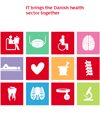 Denmark, with 5.5 million inhabitants and divided into five administrative regions, has a predominantly public healthcare provision with 60 public and several small, private hospitals, 3500 primary care physicians, GPs, and 250 pharmacies, not to mention dentists, physiotherapists etc. In addition to this, the Danish healthcare sector is characterised by a number of aspects that closely link IT to the provision of health and social care:
Denmark, with 5.5 million inhabitants and divided into five administrative regions, has a predominantly public healthcare provision with 60 public and several small, private hospitals, 3500 primary care physicians, GPs, and 250 pharmacies, not to mention dentists, physiotherapists etc. In addition to this, the Danish healthcare sector is characterised by a number of aspects that closely link IT to the provision of health and social care:
- Homecare, nursing homes, rehabilitation etc. are municipal tasks that integrate with the healthcare system, meaning patients can be discharged early from the hospital.
- Broadband penetration is the highest in Europe and more than 95% of the population have access to the Internet.
- All healthcare institutions and GPs have access to both the open and the secured Danish Health Data Network. All GPs have an electronic patient record system and use electronic communication and transactions extensively.
- About 15 different electronic patient record systems are interoperable in the GP sector and four different homecare records are used in the municipalities. Through a consensus process with vendors of almost 100 systems, all patient management systems for hospitals, GPs, homecare and pharmacies have incorporated the messaging system after special certification.
- A unique personal identifier is issued to all Danish citizens at birth, and a software-based PKI digital signature is widely used, instead of the hardware-based chip card.
- eHealth including telemedicine is implemented in municipal, regional and national collaboration.
Download: IT Brings the Danish Health Sector Together (.pdf, 1.602 KB).
Download from eHealthNews.eu Portal's mirror: IT Brings the Danish Health Sector Together (.pdf, 1.602 KB).